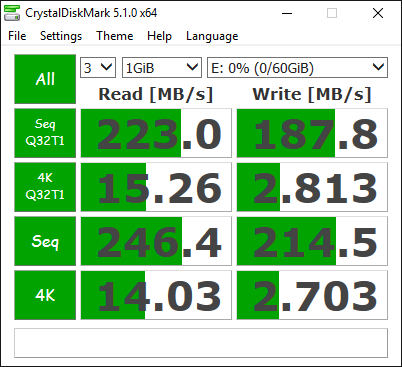CRYSTAL DISK BENCHMARK VER. 5.1.0 x64
Crystal Disk Benchmark is visually straightforward, and is used for measuring the speeds at which your storage device reads and writes in both compressible (oFill/1Fill) and random, mostly incompressible, data. Random data is more consistent with everyday use of a computer, such as transferring videos, pictures and music. We run the benchmark twice, using oFill data first, and then proceeding to test with random data. Since results typically return with nearly identical scores, we only include the results for random data samples.
When we switch to crystal disk mark that uses random data, which is more consistent with the type of data that would be recorded to the Lexar microSDXC card, results are much closer to the listed specifications and prove quite impressive.
AS SSD Benchmark uses incompressible data in their testing of SSDs, essentially providing results that would be consistent with using the heaviest workload, thus lower speeds are expected. Transfer speeds (MB/s) are seen in the left picture below and IOPS (Input/Output Operations Per Second) are on the right.
AS SSD shows us results that are very similar to that of ATTO, with results falling well short of the listed specifications.
ANVIL STORAGE UTILITIES PROFESSIONAL (BETA)
Anvil Storage Utilities is essentially an all-in-one tool for all of your SSD benchmarking needs. Anvil can be used for basic consumer testing, as well as endurance testing and threaded I/O read, write and mixed tests. It displays data regarding the SSD, and even about your system.
When we take another look using Anvil Storage Utilities, the microSDXC card returns with results that are consistent with the random data test in crystal disk mark.
 The SSD Review The Worlds Dedicated SSD Education and Review Resource |
The SSD Review The Worlds Dedicated SSD Education and Review Resource | 


most cameras and other dont have UHS-II support. it requires extra interface, so the card is limited to UHS-I in moost appication and this is limited to about 100mb/s .You should rather test this cared against other in high end camera not in windows stupid tools
Woah, those are some pretty expensive cards.
I wish manufacturers would make cards, tuned for random performance. With lots of single board computers floating around without any nand storage, cards like this would be great.
Instead of crazy 100MB/s+ sequential speed, tune the card for low QD at the expense of sequential performance. i’m sure it can be done.